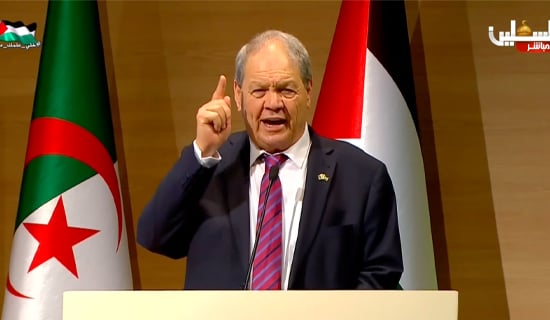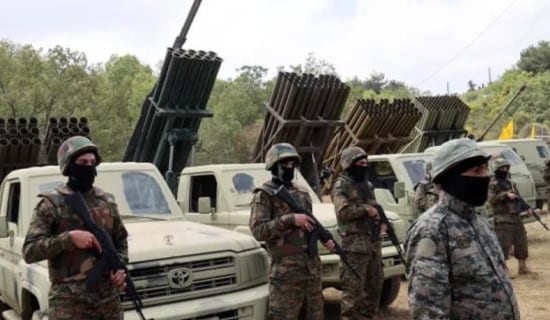Russia This Week is a weekly review by the MEMRI Russian Media Studies Project, covering the latest Russia-related news and analysis from media in Russia, the Caucasus, Central Asia, and Eastern Europe.
Cartoon Of The Week

(Source: Vk.com/politics_today)
In The News:
- Russia-Iran-Syria
- JCPOA
- Reactions To The Deployment Of More US Troops To The Middle East
- Reaction To Theresa May's Resignation
- EU Elections
- Reactions To The Austrian Scandal
- News In Brief: Russia-Turkey Relations; US Sanctions; Russia-US Relations
Russia-Iran-Syria
In an article, titled Iran Can Dislodge Russia's Bases In Syria (Subtitled Tehran Is Creating a Military Installation Between Khmeimim and Tartus), that appeared in Nyezavisima Gazeta on May 26, 2019, Russian expert Igor Subbotin discussed Russia's concerns with the visit of an Iranian oil tanker to the Syrian port of Baniyas.
Subbotin wrote:
"It cannot be excluded that the deployment of bases between the Russian positions in Tartus and Khmeimim can have far reaching consequences. The evaluation among experts is: Russia and Iran demonstrate unanimity only on the strategic level. In reality there is a host of disagreements between the two countries. Iran's activity in the Baniyas region can have a destabilizing effect not only for the region but also for the forces who are trying to stabilize the region."
The article also hinted that Iran is using the port to ship oil to Turkey evading the US sanctions.
Subbotin further added: "However, it is hard to prevent the official Damascus regime from conducting close contacts with Tehran. The credit line that was provided by the Iranian leadership to the Syrian can constitute by various estimates from 6-8 billion dollars during all the years of the Syrian war.
"The Iranian forces and the irregular Syrian formations loyal to Iran contributed to sustaining the Syrian regime. The February visit by Syria's President Bashar Assad to Tehran and his meeting with the country's Supreme Leader Ali Khamenei were one more signal that Damascus has no intention of sacrificing relations with its Shiite partner."
(Ng.ru, May 26, 2019)
JCPOA
During her weekly briefing, Russian MFA Spokesperson Maria Zakharova said:
"We are seriously concerned about the anti-Iran hysteria being whipped up in the United States. The latest round began after Teheran's announcement of its intention to suspend performance of part of its obligations under the Joint Comprehensive Plan of Action (JCPOA) regarding the Iranian nuclear program, in response to massive US sanctions.
"The question is whether Iranians have the right to take such steps. In our opinion, and according to international law, logic and an understanding of the recent years’ developments, of course they have the full right to take such steps on the basis of UNSC Resolution 2231, which approved the JCPOA in 2015…
"So no complaints can be made against Iran in the context of the JCPOA. At the same time, there is an obvious paradox, with the US having left the agreement a year ago but demanding that Iran stick to it. Speaking of the theory of US exceptionalism, this is one of its elements. Adherents of this theory in Washington, who speak about it and implement it, are apparently insisting that the US exclude itself from the modern international law system, step by step – but others should remain under these and other obligations.
"The US is aggravating the situation by sending aircraft carriers and bombers to the Persian Gulf area, which is accompanied by bellicose statements and groundless and unsubstantiated accusations that Iran is engaged in 'subversive activity' in the surrounding region and creating threats to US diplomats in neighboring Iraq.
"However, Washington does not recall those Iraqis who were killed as a result of its actions.
"It seems that Washington uses sanctions, military pressure and harsh, aggressive rhetoric to provoke a tougher response from Iran, and even seek a pretext for direct confrontation.
This is a very dangerous policy which is intended not only to deliberately destroy the JCPOA, which Iran has strictly complied with, but which runs the risk of destabilizing the entire Middle East region.
We would recommend that the US consider the consequences of its aggressive behavior and think about additional problems that such a policy could create for this long-suffering region and for international security as a whole. Otherwise, Washington will have to bear full responsibility.
Once again, Russia advocates that a meeting of the Joint Commission of the JCPOA members be convened promptly. Coordinated efforts are required to preserve the agreement and seek ways forward. The US should not impede this…"
(Mid.ru, May 23 2019)
Reactions To The US Deployment Of US Troops To The Middle East
Andrey Krasov, first deputy chair of the Duma Defense Committee, said:
"The situation in the region will remain tense. Because I do not believe that these troops will play a role in combatting terror ... they will more likely be dispatched to promote US national interests. Americans are playing confusing games, including, occasionally on the terrorists' side."
(Ria.ru, May 24, 2019)
MP Yuri Shvytkin, deputy chair of the Duma Defense Committee, said:
"Unconditionally and most unfortunately, we state the fact that any reinforced US [military] presence anywhere leads to escalation of conflict. I think deployment of additional US troops to the Middle East will trigger an escalation in tensions, if we take tangible US actions into consideration."
(Ria.ru, May 23, 2019)
Russian Deputy FM Sergey Ryabkov stated:
"The most important thing is that you do not escalate the situation, as the US and some of its allies are doing in the Persian Gulf, in the hope that someone will lose his nerve."
(Ria.ru, May 22, 2019)
Sergey Naryshkin, Chairman of the Foreign Intelligence Service (SVR), stated:
"It’s obvious, that the situation is developing into a most alarming scenario. The primary cause is clear to everyone- it is the story of the US exit from the so called Iranian nuclear deal [the JCPOA]. The majority of countries however, are quite certain that Iran will fully fulfill its commitment under that deal."
(Ria.ru, May 21, 2019)
Senator Alexey Pushkov wrote in his Twitter account:
“Iran is seriously concerned by the threat of war. Iran does not need a war, just as it did not need an attack on the Saudi oil pipeline, the oil tanker explosions and rocket explosions in Baghdad’s Green Zone. Thus, facing successive provocations, it intends to propose a non-aggression pact to the Gulf countries."
(Twitter.com/Alexey_Pushkov, May 26, 2019)
Reaction To Theresa May's Resignation

(Source: Ria.ru, May 24, 2019)
On May 24, Theresa May announced the end of her premiership.
Russian Senator Konstantin Kosachev commented:
"The resignation of the head of the Conservative Party, announced by the British Prime Minister Teresa May, was not just expected but was literally demanded by the British press and by the public: 'There is almost no government in the country, and we need a new leader.'
"The reason is clear: May 'overstrained' herself with the Brexit, although until the very end she tried to find paths acceptable to all for exiting the crisis, i.e. saving herself. But the voting in parliament on [her proposed] deal took place three times, and each time everything ended in failure for the prime minister. The new compromises, which she put forward, were rejected by both the opposition and the supporters of the hard 'Brexit', inside the party of the prime minister…
"As Theresa May’s withdrawal will not in itself affect the Brexit situation, so the problems and internal British dispositions surrounding the exit from the EU will remain.
"The outgoing Prime Minister will be remembered, above all, for the scandalous 'Highly Likely' - meaning unproved accusations against Russia, on the basis of which a number of European countries took very concrete actions to expel Russian diplomats. This foreign policy and juridical 'know-how' of May — quite in line with the tradition of British case law — seems to have become a benchmark for many other Western countries which do not consider it necessary to bother with strict evidence when it comes to Russia. So I don't think we're going to grieve excessively about May's departure.
"But further developments in bilateral relations will depend on who is going to occupy the seat left vacant by the prime minister. [We are hearing] different rumors. And most of them, alas, do not inspire optimism..."
(Echo.msk.ru/blog/kosachev, May 24, 2019)
EU Elections
Ahead of the election to the European Parliament, Russian expert Timofei Bordachev, Program Director of the Valdai Discussion Club, wrote an article, titled "What Can Russia Expect from a New Europe?", analyzing Russia-EU relations and the increasing power of right-wing populist parties in Europe.
Bordachev stressed that the EU is changing, since right-wing populist parties are replacing the "hypocritical Europe" of the elites. He stressed that European right wingers wants reforms, aimed at drastically reducing Brussels’ influence and renouncing political aspects of integration, which –according to Bordachev - will "finally" close down the aspiration of EU federalists to view the union as an "imperial project".
For Russia, Bordachev explained, an institutionally loose association of European states would mean greater freedom of maneuver for Russia in realizing its national goals in Europe. However, the Russian expert cautioned that, in order to deal with populist right-wing parties, Russia needed an entire paradigm change in its attitude to Europe and European nationalism based on the experience of WWII. "Russia’s relations with the "[EU] institutions and their elites have come to a deadlock and there seems to be no way out of it at this time. But is Russia ready for a dialogue with the forces that hold the memory of all those who perished in the most terrible war in European history – World War II, regardless of which side they were on?" Bordachev asked.
According to the Russian expert, if Russia is willing to hold a dialogue with populist right-wing parties for diplomatic or strategic reasons, it will have to undergo a "painful" reconstruction of the entire friend-or-foe approach that was forged in the fire of World War II. "If the European processes, that are gaining momentum now, prevail, soon we will have to extend our hand to the spiritual successors of those against whom our grandfathers fought at the frontline," Bordachev concluded.
(See MEMRI Special Dispatch No. 8089, Russian Expert Bordachev: A Russian Dialogue, For Strategic Reasons, With European Right-Wingers Will Require A Radical Makeover Of The Friend-Or-Foe Approach Forged In World War II, May 26, 2019)
Reactions To The Austrian Scandal

Heinz-Christian Strache in Ibiza in 2017. (Source: Youtube.com)
Russian Deputy Foreign Minister Aleksandr Grushko:
"It’s obvious, that our enemies try to come up with whatever fake story in order to prove that Russia supposedly meddles into something and resorts to unscrupulous methods".
(Ria.ru, May 21, 2019)
Aleksandr Kamkin, senior research fellow at the Center for German studies at the Institute of Europe of the Russian Academy of Sciences said:
"The entire situation can be described an information terrorism. First, there are many puzzling elements. The Russian national turned out not to be Russian but actually a Latvian citizen, the news was broken by the German and not Austrian media. Aside from that we have again that very same hysteria about the 'hand of Moscow' is a standard ghost story, which is terrifying ordinary Europeans for the last five years and here it was replicated once again.
"In my opinion we are dealing with a well-orchestrated provocation, a trap, which an experienced politician Strache walked into... Possibly in the snap elections, it [the Austrian Freedom Party] will not display such good results as up to now. It may turn out, that Chancellor Kurtz himself is the main beneficiary, since he entered the coalition with (the AFP) with a heavy heart."
(Ria.ru, May 19, 2019)
Political analyst Vladimir Shapovalov said:
"This story closely resembles the story of Russia's alleged meddling in the American elections – the scenario is one and the same. In the internal struggle between parties (in one case in America and in the other case Europe) the Russophobic factor is utilized in their internal political struggle – then this factor is whipped up to strike the political opponents. It’s interesting that the new anti-Russian campaign began precisely after the fiasco of the attempt to find a 'Russian trace' in [President Donald] Trump’s victory."
(Ria.ru, May 20, 2019)
See MEMRI Special Dispatch No. 8088, Russian Expert Lukyanov: The Austrian Populist Freedom Party Genuinely Loves Putin; Yet, It's Dangerous For Russia To Rely On Such 'Human Material', May 26, 2019.
United Russia Party's Primaries
Prime Minister Dmitry Medvedev viewed the fact that half of the participants in the United Russia Party's primaries were under 35 as a sign of renewal "This is normal because it signifies that the party is renewing itself."
(Ura.ru, May 26, 2019)
News In Brief:
Russia-Turkey Relations
- Turkish President Recep Tayyip Erdogan has said that Ankara and Moscow might launch talks on joint production of Russian-made S-500 air defense systems after the S-400 deliveries. (Sputniknews.com, May 19, 2019; read the full article)
- Ankara has sent military servicemen to Russia to undergo a training course on the use of the S-400 missile systems, Turkish Defense Minister Hulusi Akar said. (Tass.com, May 22, 2019; read the full article)
- The fulfillment of the US ultimatum to give up the purchase of Russian S-400 surface-to-air missile systems will weaken Turkey and thus the Turkish authorities are unlikely to sever their deal with Russia, Chairman of the State Duma Commission for Legal Support of the Defense Industry Development Vladimir Gutenev said. (Tass.com, May 22, 2019; read the full article)
US Sanctions
- US sanctions against Chechnya's Terek Special Rapid Response Team mean that the United States is afraid of Chechnya, Chechen leader Ramzan Kadyrov said. (Tass.com, May 16, 2019; read the full article)
- The US decision to add Chechnya's Terek Special Rapid Response Team and five Russian nationals to the Magnitsky Act represents "sanctions for the sake of sanctions," chairman of the Russian State Duma's Committee on International Affairs Leonid Slutsky said. (Tass.com, May 16, 2019; read the full article)
- Russia will take reciprocal measures in response to new US sanctions introduced on the basis of the Magnitsky Act, the Russian Embassy in Washington D.C. said in a statement. (Tass.com, May 17, 2019; read the full article)
- Russia will take countermeasures in response to US sanctions against the Chechen special unit Terek of Russia’s National Guard (Rosgvardiya) proceeding from the principle of "reciprocity" and its own national interests, presidential spokesman Dmitry Peskov has said. (Tass.com, May 17, 2019; read the full article)
Russia-US Relations
- Director of the Foreign Intelligence Service (SVR) Sergei Naryshkin has said he does not rule out the restoration of contacts between intelligence representatives of Russia and the United States. (May 22, 2019; read the full article)
- The US authorities’ position on many issues changes and it is hardly possible to predict the future of bilateral relations for the next two years, Kremlin Spokesman Dmitry Peskov told Rossiya-1 television. (May 19, 2019; read the full article)
Druzhba Pipeline
- Hungary receives clean oil through Druzhba. (Tass.com, May 17, 2019; read the full article)
- Jorg Dorler from Deloitte's consulting company in the CIS warned: "If this [situation with the Druzhba pipeline) is not resolved in a reasonable time then Russian oil deliveries will be dealt significant reputational damage and the oil refineries will begin seeking alternative delivery options, in the intermediate and long term perspective." (Ria.ru, May 26, 2019)








